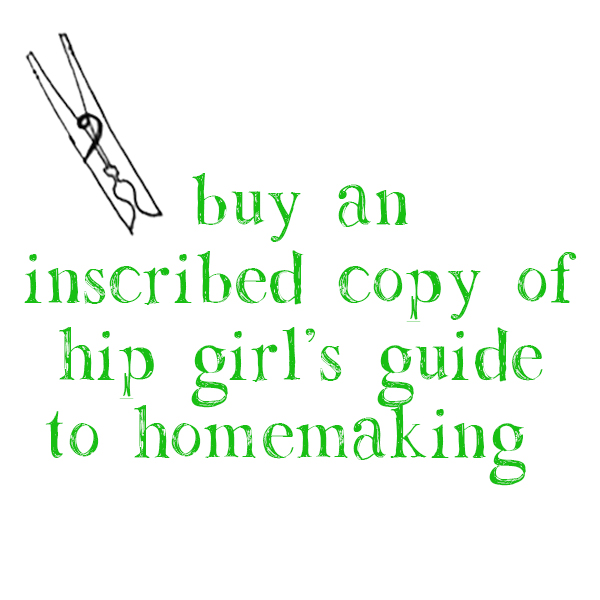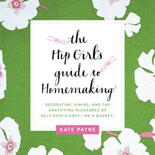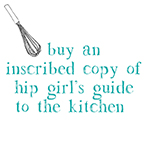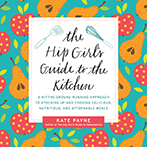Poor Girl Gourmet book giveaway
Good food is something that is so important to me and my family. I’m not just talking about flavor, but that comes as part of the package when we make our consumer choices based on how the animals, vegetables and grains we buy were treated, processed and shipped to us.
Some of you might know about my food stamps story, which I tell at length in my book (out in April). We moved to NYC and became acutely aware of our budget, $201 per month to be exact. While we worked long hours as a grad student and both of us freelance artists getting our careers off the ground, we needed help. We received food stamps from NYC for one year while J was in school. With this money we were able to eat all our meals at home (all three, really) and buy the majority of our food from local/sustainable sources all within the constraints of that $201, sometimes going over by $20-30; $230 for a month’s worth of food is still not breaking the bank for many under-employed people. Meat, of course, became a luxury item since we didn’t want to buy poor-quality, low-cost meats. We sourced our groceries from our food coop, from farmers markets around NYC (many of which accept EBT/food stamps), from pick-your-own farms and even one or two side dishes during the growing seasons from our own back-deck, bucket garden.
There’s still a huge stigma surrounding what food stamps recipients should spend money on, and unfortunately the roots stem deep into socio-economic factors and the still-very-prevalent stereotypes and rhetoric of welfare. As a former EBT recipient who was harassed in my food coop (of all places) for paying with EBT and owning an iPhone, I know it can be difficult. But as a self-employed person who still can’t afford health insurance, I’d rather spend an extra $1 at the grocery store on chicken raised without antibiotics than take my chances on food that’s not truly proven safe from a long-term health perspective. Medical bills are certainly not in our budget. We shouldn’t have to choose between taking care of our bodies with high-quality food and spending as little as possible on highly-processed, factory-farmed or GMO foods.
I know from experience that you don’t have to have money to eat food that’s both good for you and the planet. You have to be a wise shopper and learn to plan better in the kitchen, which is what I’ve been slowly learning over the past few years.
Now, off my soapbox, I’m so happy to share with you another great resource for beginning kitchen’eers, people who are just embarking on this journey or those of us who are getting the hang of it slowly. Cookbooks are a dime a dozen these days, but Amy’s book really stands out to me as one you should have on your shelf.
Poor Girl Gourmet covers the practical considerations behind eating like a king or queen at home. She adds it all up, highlighting money (or lack thereof) and getting high-quality groceries on a tight budget. The seven recipes (out of 83) that are more than $15 (and that all serve four or more people!) still don’t exceed $30. Where can you go out for a gourmet meal with three of your friends and spend less than $30?
One of my favorite things about this book beyond the price calculator and tips for getting the most bang for your buck at the grocery store is Amy’s coverage of wine and grape varietals. Up until now, I’ve happily proclaimed to know nearly nothing about wine, seeing as J is our resident wine expert. In this section Amy covers some of the great (low-cost) bottles that appear in our house regularly. I already feel more confident and empowered in the wine aisle when J isn’t by my side doing the choosing. [Next weekend I’m blogging at an Austin event called the Wine Ride, stay tuned for a breakdown of things I learn about wine pairings!]
And yes, guys, this is another book with girl in the title but is in no way for girls only. Amy shares her knowledge and love of the kitchen to anyone looking to eat better from their own kitchen.
 Enter to win this book, courtesy of Andrews McMeel Publishing, by leaving a comment on this post telling me a trick you use to keep grocery costs low, without skimping on quality. Any trick, no matter how big or small the savings.
Enter to win this book, courtesy of Andrews McMeel Publishing, by leaving a comment on this post telling me a trick you use to keep grocery costs low, without skimping on quality. Any trick, no matter how big or small the savings.
Enter by midnight on Thursday, Jan 27. Random.org will help me select a winner, who will be contacted on Friday, Jan 28. Entrants are welcomed from anywhere in the world, hooray for Andrews McMeel!
And don’t forget to leave an email address you actually check in the designated box on the comment form. Other readers won t be able to see it, just me, the person who will be emailing to tell you you won. If I don’t hear back from you by 5pm EST on the 28th, a new winner will be selected.
Good luck and happy eating!
 Kate
Kate
I got a comment this morning that was not really an entry for the book giveaway and in the interest keeping that thread going so the random number generator works as randomly as possible, I’ve removed it and placed it here.
“I’m stuck on the iPhone thing and food stamps… How did you pay the $100+ bill each month?”
I’m sure that other people have thought the same but haven’t said anything (not including the cashier guy at my co-op who decided I should be in abject poverty and give up the phone that I purchased years prior when I had a full-time job with benefits in order to fulfill his expectations of food assistance recipient). It’s important to me to address this because the whole reason I wanted to share my experience is to prevent judgement of people you see using food stamps.
Well, I’m learning that food stamps sorta belongs in the list of categories that bring up heated discussions no matter who you talk to: politics, religion, public assistance…Whatever your stance on it all, please know that until you walk a day in someone else’s shoes, you don’t really understand their situation.
While there are people out there who may have trust funds or independent means and like to pretend they’re poor or people who are just ‘milking the system’ so called, I’m not one of them.
I replied directly to the commenter this morning via email discussing with her the things that led us to, made us eligible for, and why we went off food stamps one year after starting them, which has most to do with my partner, J, finishing her one-year intensive, full-time grad program and being able to work more than 15-20 hrs/week.
I welcome constructive discussion about this topic at length via the discussions tab on the Hip Girl’s Facebook page.
 Kate
Kate
Silly me! I forgot to let you all know who won Amy’s delicious book.
After being graced with a zillion (ok, I’m an exaggerator) wonderful tips/entries by the deadline last week, let’s congratulate Amanda from Michigan. It was also her birthday on the Friday that she found out. Double fun; thanks all for such great comments.
 Budget Living,
Budget Living,  Cookbooks,
Cookbooks,  Giveaways
Giveaways 






Reader Comments (127)
Planning, planning, planning. We have a printed grocery list that we shop from weekly. We use it to plan our weeks meals and then we stick to it.
I also freeze everything. Especially things like canned chipotles when I don't use them all in a recipe and leftover tortillas. I hate waste and with planning and freezing, we rarely, rarely, rarely end up tossing food.
I'll be sharing this post with several people! Thanks for putting it out there!
I buy pizza dough from our grocery store's bakery (less than $1) and pile on seasonal veggies/ whatever is in the fridge to make a quick meal and satisfy my cravings.
Always go with a list. If you go without a list, you may as well just throw your money away. Better yet, donate it to me — I probably need it more than you. :) Seriously, though, you need to prepare a list of everything you need, pulling from your weekly menu (next tip) and checking to make sure you don’t have it in your pantry, fridge or freezer. Make sure you’re not forgetting anything. Now stick to that list.
Cooking everything from scratch, even though I feel like all I ever do is dishes (no dishwasher), rarely eating out, and then only lunch, and grocery shopping only once a week, tops. This looks like an interesting book, and it's not available at my library. Thanks for the giveaway!
Just one?! Here's a couple of quickies.
1. For people who just aren't planners. Do a small up front in vestment in Ball jars and stock a good pantry from the bulk bins. They keep fresh w-a-a-a-y longer and help you whip up something last minute from the pantry instead of being tempted to eat out.
2. Peel, slice & freeze bananas in small amounts (~1/2 - 1 cup). Substitute for ice cream when you get a craving, or at least use half bananas and half ice-cream. Super yummie and saves on calories, too.
3. I used to travel a lot for work and always felt stuck with suck-y and expensive airport food choices. I started carrying nuts, individually wrapped cheeses (those little wax ones) & maybe a few small individually wrapped pieces of chocolate (for those stressful travel moments).
I have a garden, so I get lots of fresh produce in the summer. It's a lot cheaper than buying the produce. And sometimes I trade my veggies for fruits or veggies that my friends or coworkers grow.
Also, I can or freeze extras that I have.
I also go 'picking' which is significantly cheaper than buying. Strawberries, apples, raspberries...and it's fun too!
I buy some things in bulk and freeze them into smaller portions. Others like beans, I cook from scratch. I cook most of our baked goods and bread from scratch too.
I make my own butter blend spread. My favourite butter blend spread went up by over $2.00 in a year and it was only a generic variety.
Now I buy 500g of butter for $2.50, mix it with 3 tabs of skim milk powder, 150ml of water and 250ml of canola or vegetable oil in a food processor add a little bit of salt (approx 1/4 teaspoon) if needed. Pour into container, I use my old butter blend containers.
This makes approx. 1 kilo of spread.
I usually make up a huge batch and store it in the freezer.
We try really hard to eat up or freeze our leftovers, and to finish eating that last bit of before it goes bad. It's astonishing how much food and money we can waste just by ignoring what's in the fridge!
Although cooking from scratch is what I would love, my work schedule doesn't aways allow. My husbands job keeps boil traveling alot and we started to make sure to pack and freeze meals for him when he is on the road. Which is way cheaper and healthier than the fast food alternative.
Besides discovering a couple of produce marts in the area that sell primarily local produce (local = within 250 miles, rather than from Maine, Mexico & Argentina) with prices the same as or lower than most of the grocery stores (a wonderful shock, let me tell you!), and besides getting better about making larger amounts all at once (it's just as much effort to make a 9x13 casserole as an 8x8, and then there's more servings for work lunches over the week), and getting better about using coupons - wisely, of course!, we've done a couple of other things in the last few years.
1) we started a terrific fruit & veg garden in the yard
2) we've been learning how to preserve (I grown & dry the majority of my herbs now, I've learned how to water bath can, and I have a dehydrator) & ferment (sour pickles, homemade mead & yogurt & sourdough!)
3) I've been learning how to bake our bread. Okay, I still buy the occasional croissant & fancy-looking loaf from a local bakery, but our every-day sandwich & french toast bread comes from our own oven.
This year I'm attempting to go "homemade" in as many aspects of my life as possible. Starting with things in their most natural and stripped down versions, rather than relying on shortcuts from the store. No more frozen veggies or canned beans, no more boxes, no more jars of salsa when I can chop it up myself instead. Not only is it proving to be a fun (and tasty!) challenge but it's definitely helping with the budget!
Coupons, making from scratch, making my own bread buying in bulk have been practices for about 10 years now. However, my goals for this year is to practice with dehydrating with my new Excalibor and learning to can with fresh & local. My new learning curve has been really fun (not always successful) and I'm thrilled that I'm not trashing some things after only using such a small amount! Haven't canned anything yet, but taking these winter months to prepare with kitchen items that are needed.
We save money on groceries by buying what's on sale and in season. We also stretch our meals quite gracefully. If I work it right, I may only need to cook twice or three times a week. And sometimes that means we get to freeze leftovers as well. Soup is a big thing in our household!
I cook HUGE meals on the weekends (I'm a working girl) and eat on that bounty all week--including lunches. A bank of inexpensive, hearty, tried and true recipes helps in keeping my budget balanced. I'd *love* to win this book!!!
We've cut way back on the amount of meat we buy and stick to mostly veggies, rice, and beans. Also, planning ahead by doing a lot of the prep work (cutting up veggies, mixing sauces, etc) ahead of time, so dinner can be cooked as soon as I walk in the door makes for fast meals that don't need to be drive through.
I cook from scratch, because buying things unprepared and then doing it my self reduces costs, and keeps me busy in the kitchen :)
Typically, if I see a pretty good sale on farm raised-no antibiotic chicken products, I'll stock up and make everything with chicken: chicken salad, grilled chicken on salad, chicken pot pies.
I know, nothing new, but it works for me!
<3
Becky
In Portland, we have a great local market (Limbo on 39th for anyone nearby) that has a shelf of $1.00 bags - on any given day, there will be an assortment of gallon bags full of past-their-prime fruits and veggies that are still entirely usable for cooking/eating. I like to snatch those up and then get creative in the kitchen.
Also, homemade (easy!) bread from Artisan Bread in Five Minutes a Day has been saving me bigtime dollars and rounding out many lunch and dinner meals of inexpensive homemade soup.
I've been learning more about fish, too - buying them whole and asking the clerk at the meat counter to fillet them instead of paying pricey amounts for the pre-cut portions.
Sounds like a fabulous cookbook!
We eat as few packaged items as possible. Nearly everything I buy is some kind of whole ingredient: oats, veggies, fruit, nuts, yogurt, etc. We don't buy anything individually packaged, and we eat lots of leftovers!
I try to double as many recipes as possible so we can freeze some and have lunch for the next day. It helps with those nights we don't feel like cooking and the convenience of a restaurant is calling.
From reading your article and responses it seems I am very late to the game. But I am fed up with eating crap and spending so much money on eating crap. This past year I started a four season garden and am on a mission to eat local. My tip would be, to grow whatever you can yourself and start it from seed. If you plant heirloom varieties you can save your seeds for the following season.
I cook pretty much everything from scratch and do a pantry/freezer challenge once a quarter. I also buy eggs from a backyard farm for $2/doz. You can barely buy cheap eggs from the store for $2. I also have a garden (I grow only heirlooom veggies and save my seed from year to year) as well as can and freeze what I am able to. I am always looking for other recipes that are inexpensive and healthy and I would love to win this book, thanks for the opportunity!
I make homemade soup. It's amazing how much soup you can make from one meaty ham bone or one chicken carcass. It's good, it's filling, and I can control both the cost and the quality of the ingredients. Buying veggies from International food markets helps, too. They are usually much fresher and less expensive than the junk in the grocery stores.